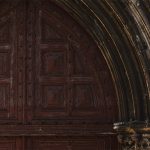A Easter meditation on Isaiah 53:4-6
Surely he took up our pain
and bore our suffering,
yet we considered him punished by God,
stricken by him, and afflicted.
5 But he was pierced for our transgressions,
he was crushed for our iniquities;
the punishment that brought us peace was on him,
and by his wounds we are healed.
6 We all, like sheep, have gone astray,
each of us has turned to our own way;
and the Lord has laid on him
the iniquity of us all.
Isaiah 53:4-6 NIV UK
The following was delivered at an Easter Tenebrae service, April 2021
At first glance this is a strange passage. Strangely written. Mysterious.
You see, we have it in the past tense. That’s the best way to recreate the Hebrew. It is written as if it is already accomplished. Finished. As if the people who lived in the time of Isaiah were at the foot of the cross looking up at the one who was suffering. It is written as if we who would not be born for another 2600 years are also standing at the foot of the cross looking back at the one who was suffering.
At whatever point in history these words are read, they will be read as a finished event. Isaiah’s sentences have verbs that suggest absolute completion. Not just something in the past, but something irrevocably completed.
It is as if this passage, like a photograph, has captured and permanently fixed the point at which all of humanity, past present and future is drawn together by one completed event; an event to which everybody since the crucifixion of Jesus looks back, but strangely, mysteriously, an event to which everybody who lived before the crucifixion of Jesus also looks back.
Why? Why would be written in this way? Why not write it like other prophecies with the expectation of the future tense?
The focus of history
Because he only way that the sins of Abraham, Isaac, Jacob, David Bathsheba Solomon could be forgiven was if this event was already accomplished in the mind of the Father, awaiting only its revealing in the death, burial and resurrection of Jesus of Nazareth. It is the foundation of all forgiveness, in both Old and New Testaments.
We know, don’t we, that Scripture says Jesus was “the Lamb slain from before the foundation of the world.” (Rev 13:8) There was never a moment in human history in which this event was not the central driving focus. It gave history its movement. A thousand times it prevented history from ending like Sodom and Gomorrah. It is the unseen, unstoppable river running through even the darkest canyons of human corruption.
It was driven by the love of the Father. In the words he spoke through the prophet Jeremiah (31:3), “I have loved you with an everlasting love; I have drawn you with unfailing kindness.”
And what we see here is that this mysterious, impenetrable love was set against the hopelessness of fallen humanity.
The human condition
There are two Hebrew words used here of our condition: the word “transgression” which speaks of deliberate revolt. The wilful crossing of the line that we know we should not cross. And there is the word “iniquity”: a word pointing to our innate depravity. Our utter incapacity to be anything better than what we are. A word that tells us it is not just what we do, but who we are that has Christ there on the cross.
We don’t need the prophet Jeremiah to tell us, do we, that “The heart is deceitful above all things and desperately wicked…” (17:9) We have known it in so many reflective moments. In every hurt we have inflicted on the ones we love. In every promise we have broken. Every time truth has succumbed to self-interest. Every time we have seen our new moral resolutions lying in ashes our feet.
In Isaiah’s little word-photograph we have both words, transgression and iniquity. Jesus was wounded for both.
The eternal love of the Father was and is eternally overriding Jeremiah’s piercing description of the innate disability of the human heart—”deceitful above all things and desperately wicked.” That love drove the eternal plan of God towards this climactic moment of human history.
Wounding and healing
And in these photographic sentences, we look up and look back at the one who is suffering. We hear the cry, my God, why have you forsaken me. The self-righteous response might be that surely his must be a life of deep and desperate sin to require him to be so brutalised, so wounded and so utterly forsaken by God. Surely he has been struck down by God. Surely his been afflicted by God. And then we meet another word: ‘BUT’
The three-letter word that begins Isaiah’s 5th verse is probably one of the largest words in the Bible. It is the point at which the spotlight is turned onto us. That little word absorbs us into the event we are witnessing, and leaves us either protesting our own innocence orspeechless in our grasp of what is actually happening. It is the word that links us to him.
We considered him to be smitten by God and afflicted but, but! he was wounded for our transgressions. He was bruised for our iniquities.
And out of his wounding comes our healing. Oh, understand this… In Deuteronomy 32:39, with his people gathered on the edge of the promised land, Yahweh has them look back on the dramas of their wilderness experience, saying,
I put to death and I bring to life,
I have wounded and I will heal,
and no one can deliver out of my hand.
All that had taken place as a result of or rebellion and iniquity—death and life, wounding and healing—are in Yahweh’s hands. Isaiah and especially Jeremiah speak often of the wounding of the people by Yahweh as punishment for their rebellion. And in the horrific aftermath of the destruction of Jerusalem, the prophet Jeremiah poses the question, “Your wound is as deep as the sea. Who can heal you?
Isaiah 53:5 gives us the answer: Yahweh himself will heal through the sacrifice of his son, the ‘servant’. So actually yes, yes, this suffering one was smitten by God and afflicted. BUT not for himself. For me. For you. He was wounded, so we are healed.
An eternal issue
Have you noticed the change in the verb tenses? He was wounded, we are healed[1]. Can you see the change in verb tense? Not were healed only to need it again. Not will be healed of this and that ailment. No, this is neither temporary nor petty. This is eternal! This goes to the depths of who we are and the wounding that we deserve, the judgement and wounding that hung over us with every breath we have ever taken.
Eternally, the wounding has taken place—on him. So too has the healing taken place—on us. We are healed. Isaiah writes that the punishment that was so deeply, desperately needed to bring us to peace with God and remove his wounding wrath from us was placed in Christ.
Do we need Isaiah in verse 6 to remind us that like sheep, in wilful stupidity, we have wandered down every murky labyrinth of our own making, every new distraction and every attempt at self-justification took us deeper into the darkness of God’s absence. But the Lord has laid on him our iniquity. He entered that darkness for us.
As we stand alongside all of the saints of the Old Testament in their sin and iniquity, we are hand in hand, knowing that a substitute has felt the anguish of being judged and banished from the sight of God. A substitute has cried out in that anguish, ‘My God My God why have you forsaken me.” That moment was always intended to arrive. And the wonder of it is, he arrived at that moment…willingly.
In that event, captured indelibly in this small photograph of words, we have the one central moment, the climax of human history. The divine forgone conclusion to which history always pointed. That divine accomplishment to which history must always look back.
And that
without which, we would be irredeemably, eternally, lost.
[1] The Hebrew is in the perfect tense, a tense indicating the permanent ongoing results of what has been done. Hence our English present tense. Every day, every future year, it is always and ever present for that day.






